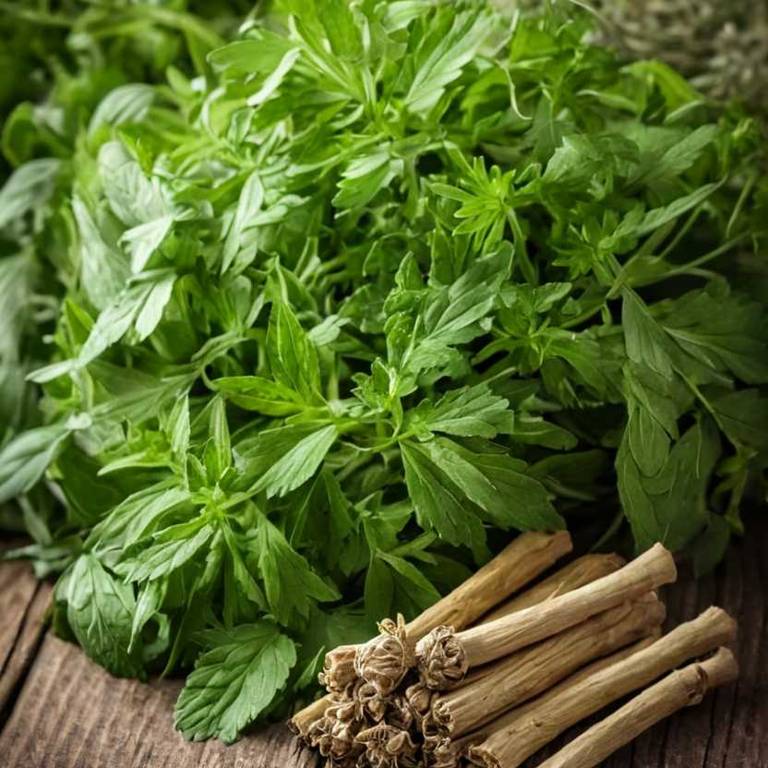10 Best Angelica Sinensis Health Benefits

Angelica sinensis, also known as dong quai, is a traditional Chinese medicinal herb renowned for its numerous health benefits.
It is particularly valued for its ability to support women's health, helping to regulate menstrual cycles, alleviate cramps, and reduce symptoms of menopause. This herb is also rich in antioxidants, which help combat oxidative stress and inflammation in the body. Its compounds, such as ligustilide and ferulic acid, are believed to enhance blood circulation and promote cardiovascular health.
Additionally, Angelica sinensis may support bone health and have potential anti-cancer properties, making it a versatile and beneficial herb in holistic medicine.
1. Reduces menstrual pain
Angelica sinensis reduces menstrual pain by acting as a natural antispasmodic and analgesic, helping to ease cramping and discomfort associated with dysmenorrhea.
It contains compounds like ligustilide and ferulic acid, which have been shown to relax uterine muscles and reduce inflammation. Traditional Chinese medicine has long used Angelica sinensis to support women's reproductive health during menstruation. Modern scientific studies also support its efficacy in alleviating menstrual symptoms.
This herb offers a gentle, holistic alternative for women seeking relief from period pain without harsh pharmaceuticals.
2. Supports liver function
Angelica sinensis supports liver function by promoting the detoxification processes within the liver.
It helps in the regeneration of liver cells and enhances the organ's ability to metabolize toxins. This herb is known to protect the liver from damage caused by environmental toxins and excessive alcohol consumption. Its active compounds, such as ligustilide and angelica acid, contribute to its hepatoprotective effects.
Regular use of Angelica sinensis may aid in maintaining optimal liver health and function.
3. Boosts immune system
Angelica sinensis boosts immune system by stimulating the production of white blood cells, which are essential for fighting off infections.
It contains various bioactive compounds, such as alkaloids and essential oils, that contribute to its immune-enhancing properties. These compounds help regulate the body’s inflammatory response and support the overall function of the immune system. Regular consumption of Angelica sinensis may also enhance the body’s ability to resist viral and bacterial infections.
As a result, it is often used in traditional medicine to promote wellness and strengthen immunity.
4. Boosts blood circulation
Angelica sinensis boosts blood circulation by promoting the production of red blood cells and improving the oxygen-carrying capacity of the blood.
This herb contains compounds like ferulic acid and ligustilide, which help dilate blood vessels and enhance blood flow throughout the body. Improved circulation can lead to better overall health, including reduced risk of cardiovascular diseases and enhanced delivery of nutrients to tissues. It is commonly used in traditional Chinese medicine to treat conditions related to poor circulation, such as cold hands and feet or menstrual disorders.
Regular consumption of Angelica sinensis may support cardiovascular health and contribute to a more efficient circulatory system.
5. Improves skin health
Angelica sinensis improves skin health by promoting collagen production, which helps maintain skin elasticity and reduce the appearance of wrinkles.
It also contains antioxidants that combat free radicals, preventing oxidative stress and premature aging. The herb is known to enhance blood circulation, delivering essential nutrients to the skin for a healthier glow. Additionally, Angelica sinensis has anti-inflammatory properties that can soothe skin conditions like eczema and acne.
Regular use of Angelica sinensis may contribute to a more radiant, youthful complexion.
6. Relieves nervous tension
Angelica sinensis relieves nervous tension by promoting a calming effect on the central nervous system.
It contains compounds such as ligustilide and butylphthalide, which have been shown to reduce anxiety and stress. This herb is often used in traditional Chinese medicine to address symptoms of stress, insomnia, and irritability. Its ability to regulate emotional balance makes it a valuable natural remedy for modern-day stress-related disorders.
Regular use of Angelica sinensis may help improve overall mental well-being and emotional stability.
7. Promotes hair growth
Angelica sinensis promotes hair growth by enhancing blood circulation to the scalp, which delivers essential nutrients and oxygen to hair follicles.
It contains compounds like ferulic acid and ligustilide that stimulate the hair growth cycle and reduce hair loss. This herb also helps in strengthening the hair shaft, making it more resilient and less prone to breakage. Regular use of Angelica sinensis can lead to thicker, healthier hair over time.
Its traditional use in Chinese medicine supports its role as a natural remedy for improving hair growth and vitality.
8. Enhances vitality
Angelica sinensis enhances vitality by stimulating the body's energy production and improving overall physical and mental stamina.
This herb is known to support the circulatory system, ensuring efficient oxygen and nutrient delivery to cells, which in turn boosts energy levels. It also helps in reducing fatigue and promoting a sense of well-being, making it beneficial for individuals experiencing chronic exhaustion. The adaptogenic properties of Angelica sinensis enable the body to better cope with stress, further contributing to enhanced vitality.
Regular use of this traditional Chinese herb can lead to improved endurance and a more balanced, active lifestyle.
9. Enhances bone strength
Angelica sinensis enhances bone strength by promoting the formation and maintenance of healthy bone tissue.
It contains compounds such as calcium, phosphorus, and various phytoestrogens that contribute to increased bone density and improved mineralization. Studies suggest that the herb may stimulate osteoblast activity, which is essential for bone growth and repair. Its traditional use in Chinese medicine aligns with modern research indicating its potential role in preventing osteoporosis.
Incorporating Angelica sinensis into a balanced diet or supplement regimen may support overall skeletal health.
10. Aids digestive health
Angelica sinensis aids digestive health by promoting the smooth flow of qi and reducing gastrointestinal discomfort.
It contains compounds that support the function of the digestive system, helping to alleviate bloating, gas, and indigestion. This herb is often used in traditional Chinese medicine to improve appetite and ease symptoms of dyspepsia. Its anti-inflammatory and carminative properties contribute to a healthier gut environment.
Regular use of Angelica sinensis may enhance overall digestive efficiency and comfort.